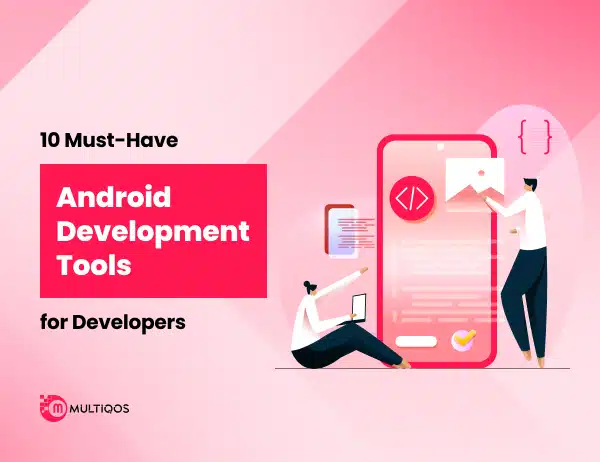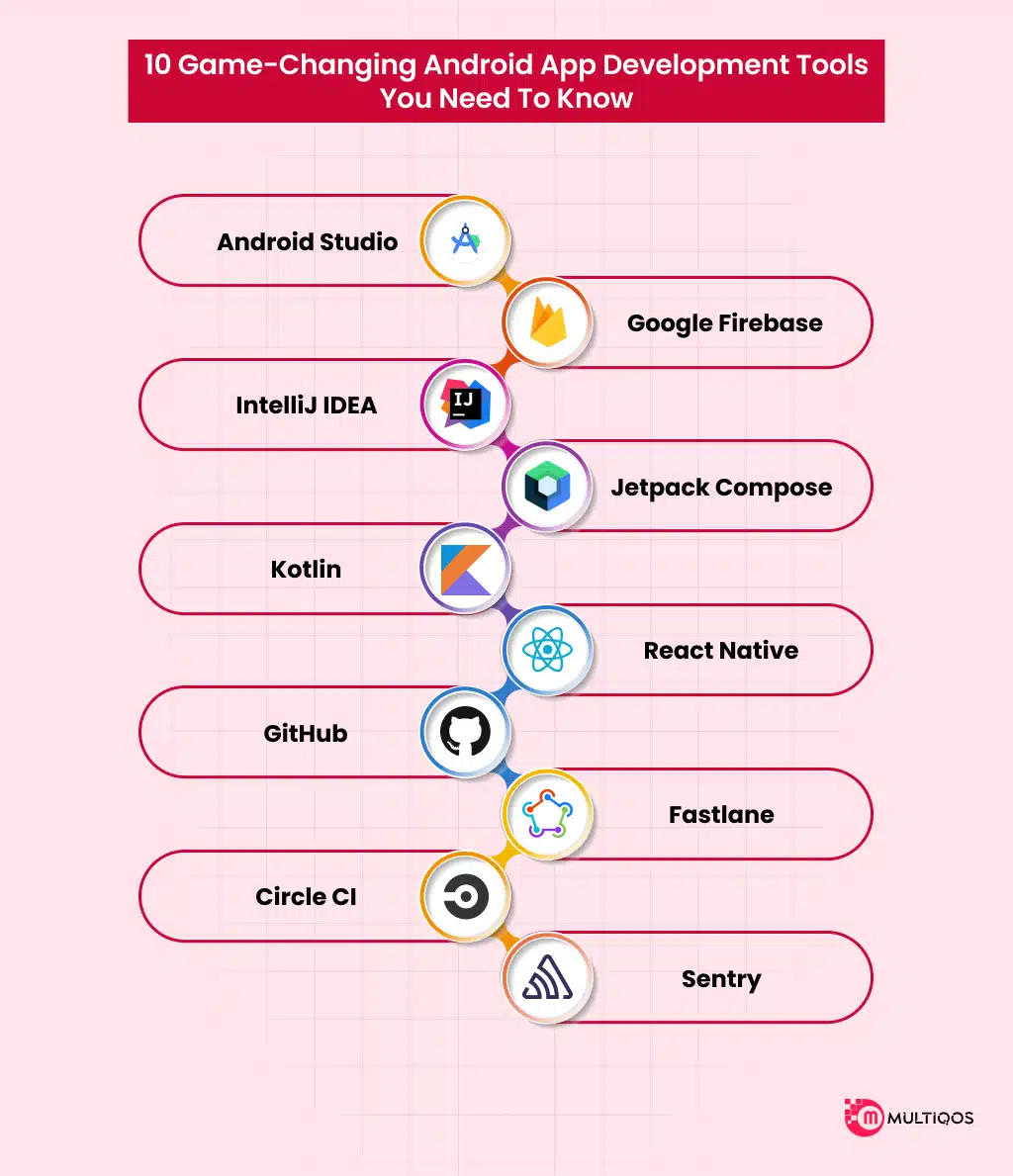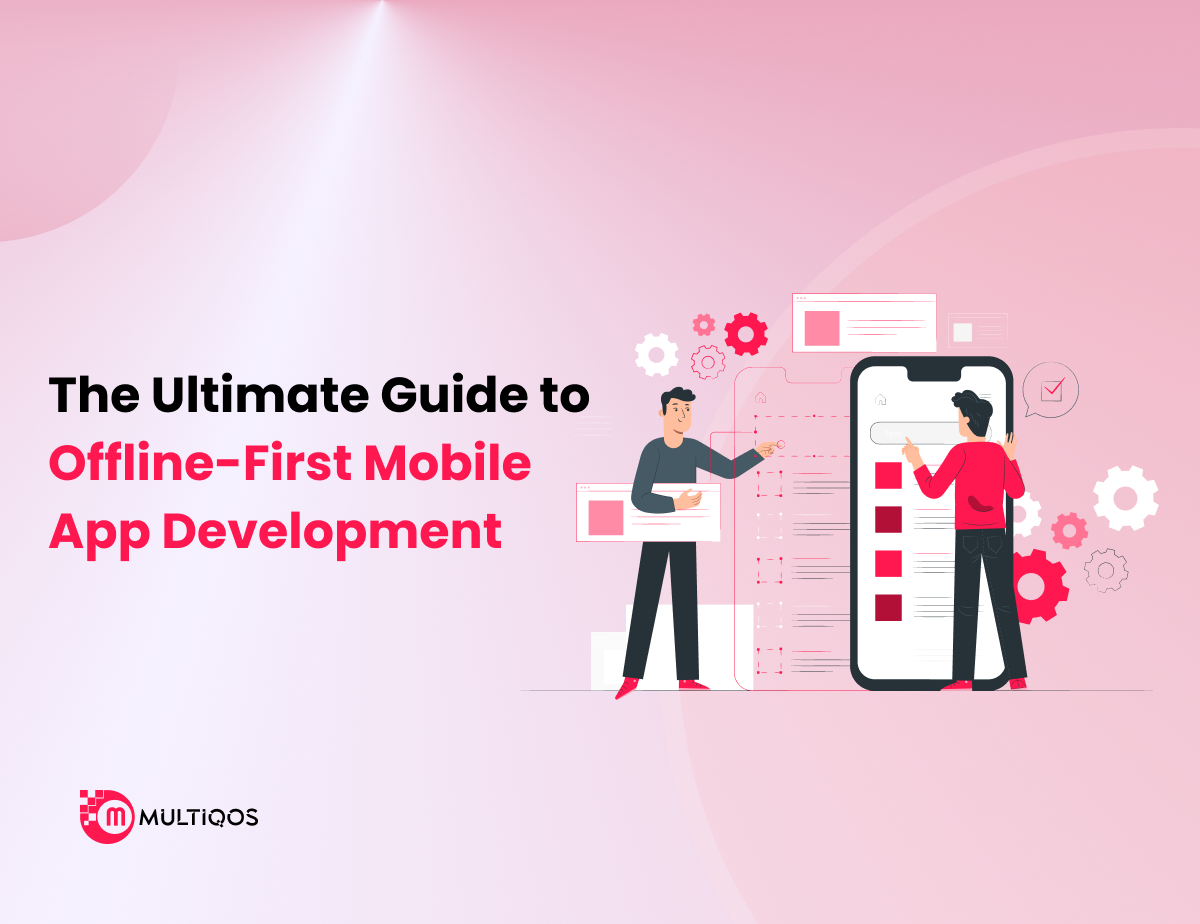10 Must-Have Android App Development Tools for Developers

Summary:
Selection of the appropriate tools for Android development plays a significant role in the overall quality, efficiency, and scalability of mobile applications. This blog underscores a basic requirement for the selection of tools that improve productivity, reduce the complexity of the work processes, and facilitate effortless deployment and monitoring.
Whether you’re an individual developer or a member of an experienced Android development company, gaining insight into the tools that matter the most can improve your app development processes and user experience design.
Introduction
Android remains the undisputed giant in the high-velocity realm of mobile apps, operating countless devices internationally. If you are an experienced developer and fiddling with your first application, the right resources can mean a hobbled launch as well as a five-star experience on Google Play. The Android ecosystem provides a myriad of resources aimed at streamlining coding systems alongside speeding up testing, enabling a developer’s journey to be easier, more intelligent, and far more scalable.
But, how does one separate the essentials from the excess with such a wide variety of choices available? In this post, we are revealing the 10 Android development tools that can exponentially enhance driving productivity, workflow, and the seamless construction of user-loved applications.
10 Game-Changing Android App Development Tools You Need To Know
1. Android Studio
You’ll be surprised to know that the best and widely used IDE for Android app development is Android Studio; it supports multiple workflows when it comes to mobile development. Android Studio is backed by Google, it includes sophisticated tools such as a rich text editor, profilers, emulators, and layout editors.
Additionally, its perfectly linked implementation with Gradle performs build automation without any problems, and the advanced code completion tools eliminate a substantial amount of troubleshooting required later. Because of these factors, Android Studio is one of the most important Android development tools on the market.
2. Google Firebase
Firebase is an extensive mobile and web application development platform that offers full-fledged backend-as-a-service solutions (BaaS). It is one of the most popular Android development tools on the market. Its utility combines real-time databases, cloud messaging, A/B testing, authentication, and analytics, which entirely bypass server infrastructure construction.
It significantly permits rapid app deployment and easy scale which mainly helps small and mid-sized dev teams and start upsto bypass complicated server construction.
3. IntelliJ IDEA
Many developers still opt for the original IntelliJ IDEA due to its superior language support and productivity features. Even though Android Studio is based off IntelliJ IDEA, its scope is restricted to supporting the development of Android applications, thus further widening its target audience.
The powerful text-editing automation, code navigation, refactoring, and version control features of IntelliJ IDEA polished the writing and accelerated the pace of development so it is easier to inflate and maintain within the modern coding standards. Its multi-purpose capabilities make IntelliJ IDEA an extraordinary favorite all over the globe, alongside Android development tools.
4. Jetpack Compose
Jetpack Compose is the contemporary toolkit provided by Google for developing native Android user interfaces based on a declarative approach. It reduces the complexity associated with development by describing user interface elements in code rather than in XML.
The toolkit bundles effortlessly with Kotlin and provides drag-and-drop snapshots in real time, which simplifies the process of designing the user interface and makes it far less complicated in comparison to traditional methods. For effortless and compelling interface construction, this toolkit has rapidly risen to prominence among other Android development tools.
5. Kotlin
Kotlin is favoured over other languages for Android app development due to its interoperability with Java, full null safety, and concise syntax. Its modern programming features, alongside reduced boilerplate code, significantly improve a developer’s productivity.
Kotlin is not merely a programming language; it is a tool that adds great value to your Android development tool stack, as Google has officially adopted it as the primary language.
6. React Native
React Native is revolutionary for developers who want to create cross-platform applications but do not want to sacrifice productivity. Its initial developers, Meta, enabled the creation of applications in JavaScript, rendering them using native components, which accelerates the development process and reduces cost (while maintaining almost native quality).
7. GitHub
In the modern development era, version control is a necessity, and GitHub is one of the best tools used by developers for managing code and collaborating. Using its excellent functionalities, such as pull requests, code reviews, issue tracking, and GitHub Actions for automation, the platform makes the development lifecycle more efficient.
For developing purposes, Android developers can easily access GitHub not only as a repository for community interaction; hence, but also as one of the most collaborative Android development tools.
8. Fastlane
Fastlane automates monotonous activities such as compiling, testing, and deploying Android applications. Whether it is uploading an application to the Google Play Store or handling code signing, Fastlane reduces operational overhead and minimizes human mistakes.
It works effortlessly with CI/CD pipelines and supports plugins for further tailoring. In the realm of automation, Fastlane is one of those Android development tools you did not know about—until you do.
9. Circle CI
CircleCI is a leading platform in the industry that enables building, testing, and deploying Android applications with continuous integration and delivery. Its support for custom Docker images, parallelism, and advanced caching, alongside other features, optimizes the development pipeline, thus enabling more frequent updates.
As a scalable CI/CD solution, CircleCI stands out among the Android development tools in terms of flexibility and performance.
10. Sentry
Crashes are undesirable under any circumstance, but the Sentry software tool makes it relatively easy to track and repair crashes when they do occur. Sentry is effective in reporting Android app crashes, assessing their performance, and providing in-depth analyses and evaluations of the Android application’s auxiliary services.
It allows for a simple software development kit (SDK) integration and real-time monitoring, which contributes to effective protective oversight in providing a quality experience and smoother user navigation. Considered among Android development tools, it offers the most unobtrusive debugging and protects against erroneous and improper monitoring activities after the application has been launched.
Conclusion
Mastering Android app development involves more than just well-crafted code; it entails selecting tools that will aid in processes, get rid of bottlenecks, and materialize the developer’s vision in an effective and precise manner. The 10 Android development tools we’ve reviewed are not mere tools, but rather aid and trusted companions to a developer who seeks to build an effective, high-performing, and user-friendly application.
Working individually, alongside colleagues, or contracted out to an experienced Android app development company, having a functional toolkit makes all the difference. Every mobile experience that users have come to expect is perfected by a specific tool, from coding and UI design to testing, deployment, and monitoring.
Make sure you are properly prepared and equipped with all the essentials so that guesswork is eliminated—this will ensure Android apps are crafted unrivaled in the competitive Android apps ecosystem.
Frequently Asked Questions
It is ideal for beginners to start with Android Studio and Google Firebase because they are well-documented and supported, alongside Kotlin’s community, which makes learning simple for beginners.
Both resources are potent depending on the particular project. However, Android Studio is more tailored towards Android development as it comes already set up with all the SDKs and emulators while IntelliJ IDEA is more adaptable towards multi-platform development.
Indeed, React Native is capable of single-handedly addressing the Android development, albeit its main aim is to facilitate the creation of applications for both the Android and iOS platforms.
Not necessarily. The recommended tools differ based on the complexity of your app, your workflow, and whether you are working solo or as part of a team. That said, the right blend of Android development tools will most certainly improve productivity and quality of work.
For complex applications or startups lacking an internal development team, employing a professional Android development firm can bolster quality and operational efficiency.
Get In Touch







